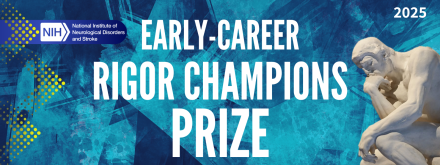The NINDS Office of Research Quality seeks to promote research rigor and transparent reporting and to foster a culture of research quality within the scientific ecosystem. As part of this mission, NINDS launched the inaugural NINDS Rigor Champions Prize in 2023.
In 2025, a new iteration of the Prize was launched to focus specifically on early-career rigor champions. Expand the accordions below to learn more.

We held a webinar on April 23, 2025 to meet past winners of the NINDS Rigor Champions Prize, learn more about the prize, and find out from them about how others can get involved in efforts to improve attention to rigor and transparency. Please check out the event page and video recording for more information.
NINDS Early-Career Rigor Champions Prize (Closed June 2025)

The goal of the NINDS Early-Career Rigor Champions Prize was to recognize and reward individuals and small teams of early-career rigor champions who are promoting enhanced attention to research rigor and raising awareness of these practices for others.
The NINDS Early-Career Rigor Champions Prize submission included responding to six short essay prompts describing activities performed to improve practices related to scientific rigor and evidence of their impact on raising awareness of these practices more broadly. Submissions were judged based on the significance of the activity as it pertains to rigor, the championship of scientific rigor, and the impact the activity has had. $50,000 in total cash prizes were awarded.
Find out more about the Prize at the Challenge.gov website or watch this informational video. You may learn more about the winners below.
Winners - Tier 1 ($10,000)
Catherine Kean – Individual
As an undergraduate teaching assistant for a molecular biology course at Tufts University, Ms. Kean proactively devised and implemented improvements in the journal club portion of the class to foster critical thinking via structured prompts, which helped students pay more attention to experimental design and limitations in class as well as during seminars by visiting speakers. Her materials have often been requested by other professors at the institution so that they could make similar changes across the curriculum.
Stephanie Noble, Fabricio Cravo, and Alexandra Fischbach – Team
This team represents the Neuroscience Precision Research & Idiographic Statistical Methods (NeuroPRISM) Laboratory at Northeastern University, which has a mission to “facilitate more reliable and valid neuroimaging studies”. Founded by Dr. Stephanie Noble, this laboratory/team has a history of calling attention to issues of statistics, analytical reliability/validity, multiple comparisons, and power analysis within their scientific community and has contributed by developing open-source tools and educational opportunities via courses, training protocols, and workshops.
Winners - Tier 2 ($7,500)
Kylee Hillman and Teng-Jui Lin – Team
As graduate students at the University of California, Berkeley, Ms. Hillman and Mr. Lin have raised awareness around issues of data visualization and inference by analyzing thousands of papers for misleading data presentation via graph axes, dimensional distortions, and colormaps. This team has shared their work via preprints (1, 2) and provided guidance to the community on how to present data in more transparent and interpretable ways.
Odilia Lu – Individual
Ms. Lu, as a graduate student at the University of California, Berkeley, coordinated a major replicability project to assess mouse behavior across five laboratories and led efforts to standardize protocols, compile data, and disseminate the work. This study has spurred multiple discussions in the scientific community about the importance of reliability, reproducibility, and replicability, and Ms. Lu continues to promote multi-laboratory studies as a way to achieve better scientific inference.
Winners - Tier 3 ($5,000)
James Borders – Individual
As a graduate student and postdoctoral fellow at Teacher’s College, Columbia University, Dr. Borders started a laboratory journal club on statistical practices and performed a study to determine better approaches to experimental design in dysphagia research. He has additionally shared open-source tools and tutorials to assist in improving experimental design and data analysis in the scientific community.
Alan Emanuel – Individual
As a graduate student, Dr. Emanuel taught lectures on scientific reasoning and experimental design to high school students and, since becoming a faculty member at Emory University, he has attempted to fill a local gap in experimental design training by starting an annual workshop for Neuroscience Ph.D. students. These educational efforts have provided practical training in statistics, rigorous data analysis, and transparent reporting for future scientists.
Jay Lusk – Individual
Dr. Lusk is a clinician-scientist at the University of North Caroline at Chapel Hill who performs observational research and has a strong interest in improving causal inference. He has helped develop an educational program through Duke University to teach undergraduate, graduate, and postdoctoral researchers about clinical research, which includes instruction in preregistration, use of causal frameworks, and reporting transparency.
NINDS Rigor Champions Prize (Closed December 2023)

The goal of this prize was to help recognize and reward those individuals and small teams who have championed rigor and transparency practices above and beyond their normal job duties and who have helped cultivate a culture that promotes robust, high-quality neuroscience research.
NINDS Rigor Champions Prize submissions included short essays describing activities performed to improve culture and practice related to scientific rigor and transparency and evidence of their implementation and success. Submissions were judged based on their championship of and commitment to the described activity, the significance of the activity as it pertains to rigor and transparency, and the impact the activity has had. The winners received a $10,000 cash prize.
Five Prize winners and three honorable mentions were selected in March 2024. NINDS congratulates all of the winners and honorable mentions for their important contributions to enhancing rigor and transparency in neuroscience research. NINDS also thanks all of the rigor champions who submitted an entry and are helping to change the culture of science.
We also held a webinar on April 23, 2025 to meet past winners of the NINDS Rigor Champions Prize, learn more about the Prize, and find out from them about how others can get involved in efforts to improve attention to rigor and transparency. You may watch the video recording or learn more about the winners below.
Winners
Michael Dougherty – Individual
Dr. Michael Dougherty, Chair of the Department of Psychology at the University of Maryland, catalyzed the development of new departmental tenure and promotion guidelines that reward rigorous research activities, openness, and transparency; created a repository for information on advancing open science through incentives; and held workshops to guide departmental leaders and others across the nation on tenure and promotion policy reform. Dr. Dougherty has sought to reform the academic incentive system by shifting it away from a focus on “volume and reputation-based metrics” to instead focus on behaviors that more directly promote rigor and transparency. His efforts have culminated in a toolkit that other departments can use to better align their values and the behaviors that they incentivize.
Kevin Knudtson, Katia Sol-Church, Frances Weis-Garcia, and Sheenah Mische – Team
This team, consisting of faculty and shared research resource (core) facility directors from various institutions, were catalysts in creating the Committee on Core Rigor and Reproducibility (CCoRRe) within the Association of Biomolecular Resource Facilities (ABRF). Members of this team founded CCoRRe in 2016 to “raise the awareness of the ABRF members and the core community at large on the importance of adopting rigorous and transparent practices by providing platforms/forums during the society’s annual meeting, regional chapter meetings, and virtual Town Halls.” These individuals continue to serve on CCoRRe and support its efforts to encourage the use of Research Resource Identifiers (RRIDs), facilitate data management plans, address cognitive biases during experimentation, and provide other training and tools to help core facilities enhance rigor, transparency, and reproducibility both within their facilities and in the broader scientific community.
Dana Lapato, Nina Exner, and Timothy York – Team
This team, consisting of a Data Librarian, Assistant Professor, and Professor, led the Virginia Commonwealth University (VCU) Data Science Lab in providing university-wide courses, consultations, open educational materials, workshops, seminars, and a ReproducibiliTea journal club that collectively addressed topics of open science, study preregistration, data science, and reproducible computer programming. This team has championed these efforts and continually sought additional support despite changing team membership and time-limited resources that have threatened the longevity of the program. Through their efforts, over a thousand university trainees and staff have started using new tools to improve the transparency and reproducibility of their scientific workflows, and new rigor-related course requirements have been integrated into VCU graduate programs.
Michela (Micky) Marinelli – Individual
Dr. Michela (Micky) Marinelli, an Associate Professor of Neuroscience at the University of Texas at Austin, developed a comprehensive elective undergraduate and graduate course titled “Analytical Skepticism” focused on “improving the ability to judge and ‘do’ science well.” She has additionally presented key aspects of this course, such as the influence of cognitive biases and human error on experiments (topics that are often overlooked) to the lay public. Former students have praised her course for changing how they approach science even after they have moved into the scientific workforce.
Melissa Rethlefsen– Individual
As the Deputy Director/Associate Librarian at the University of Utah, Melissa Rethlefsen spearheaded efforts to change institutional culture related to research rigor by organizing two conferences separated by a weekly, multidisciplinary "Grand Rounds Research Reproducibility" seminar series; a campus-wide Research Reproducibility Coalition; and a course that collectively served to enhance awareness and seek ways to improve rigor and transparency. After moving to the University of Florida, her efforts to increase awareness continued with a third widely attended virtual conference. These meetings were some of the earliest efforts to create a national conference on scientific rigor, transparency, and reproducibility, and they directly led to updated journal reporting guidelines as well as multiple scientists planning to change their research practices.
Honorable Mentions
Chantelle Ferland-Beckham and Magali Haas – Team
Drs. Chantelle Ferland-Beckham and Magali Haas at the nonprofit Cohens Veterans Bioscience helped conceptualize and catalyze the development of the Best Negative Data Prize in Preclinical Neuroscience, which rewards researchers who have published rigorously obtained null results. This prize is awarded to one research paper every other year, with a similar prize for clinical neuroscience awarded in the intervening year, and the winner is publicized at the annual European College for Pharmacology Congress to increase awareness and celebrate rigorous null results. This initiative was developed to combat publication bias against null studies by incentivizing publication and signaling to researchers that null results are valuable.
Megan Hagenauer– Individual
Dr. Megan Hagenauer, an Assistant Research Scientist at the University of Michigan, has hosted events associated with the Society for Neuroscience annual meeting that provide a space to discuss scientific “failures” and experimental mistakes. These events have thus far included a storytelling session and two sponsored socials, and their aim has been to reduce stigma around reporting errors or weaknesses in one’s experiments. Especially popular with trainees, these well-attended events have allowed scientists to share how their science has gone wrong and to learn that this is a common experience.
William Ngiam – Individual
While a Postdoctoral Scholar at the University of Chicago, Dr. William Ngiam founded a local chapter of the ReproducibiliTea journal club, started a podcast on related topics, and joined the steering committee of the global ReproducibiliTea network. ReproducibiliTea aims to stimulate discussions amongst early career researchers and empower them to practice research rigor and open science. Dr. Ngiam’s efforts have led to increased discussions about and implementation of open and reproducible research practices amongst early career researchers in the University of Chicago Department of Psychology.
